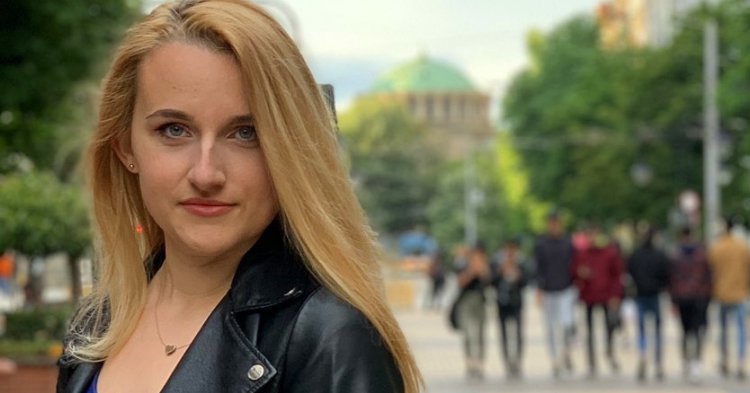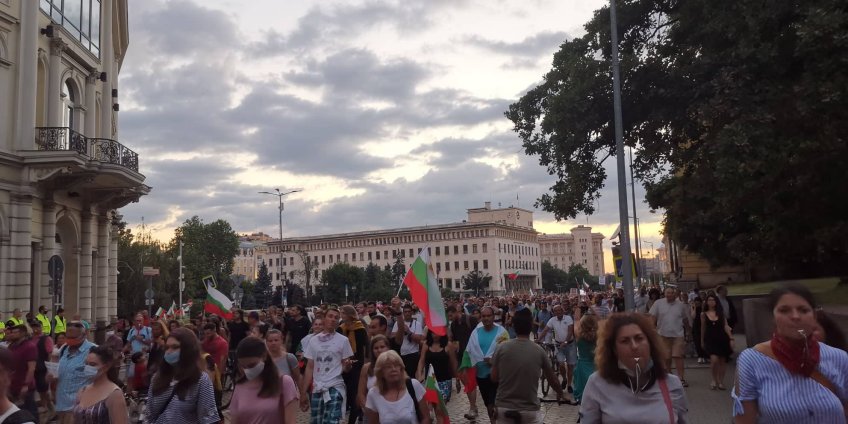DEMOCRACY UNDER PRESSURE.
This article is part of our feature investigating challenges to democracy in Europe. From 22nd March to 4th April, we are digging into the most troublesome threats to citizens’ freedoms and participation in democratic society across our continent – from data privacy to the right to protest, from constrained access to a free press to violence against women.
Freedom of press is an important pillar needed to hold democracy upright. In Bulgaria, it is crumbling. In 2020 the country was ranked 111th place globally on the World Press Freedom Index by the non-profit organisation Reporters Without Borders (RSF). It is by far the worst ranking of a European country, with Hungary following in 89th place. The New Federalist talked to Kristina Dimova, a young journalist from Bulgaria who is fighting for a diverse and free media landscape in her country through her own media start-up.
The black sheep of Europe’s press freedom
In the report accompanying the global ranking of Bulgaria’s freedom of press, the RSF describes the country as the “black sheep” of Europe. Despite growing international pressure, the situation has not improved since the last ranking in 2019. The media in Bulgaria is caught up in a net of corruption that is spun by politicians and oligarchs alike.
Speaking up against this network of power and corruption comes at its own price, according to Kristina: ”People are scared because they can lose their job. They are not even scared of losing money, they are scared of the power they are facing. Most of the media in Bulgaria is now in the hands of businessmen and men in power.” Prominent examples of journalists losing their jobs over their reporting are Miroluba Benatova and Genka Shikerova. Both journalists were forced to leave the Nova Broadcasting Group and BTV Media Group after both networks changed their ownership. In 2019, the Nova Broadcasting Group was acquired by Advance Media Group, a company owned by Bulgarian businessmen and oligarch brothers Kiril and Georgi Domuschiev.
Less than two years later, the Nova Broadcasting Group changed ownership again and was acquired by United Group, a media operator in South-Eastern Europe. United’s parent company is BC Partners, a London-based investment firm who claims that an editorial board outside of Bulgaria will guarantee Nova’s independence. So far, there have been mentions of Bulgaria’s economic stability but no mention of Bulgaria’s stability at Europe’s rock bottom when it comes to freedom of press.
For now, it is too soon to answer the question of whether a capitalist driven enterprise will strengthen and uphold the values of freedom of speech, critical thought, and transparency of independent journalism in Bulgaria. But it is never too soon to ask the question.
Changing a crumbling media landscape
While transparency is key for politicians and journalists alike, Europe’s black sheep still allocates EU and public funding to media outlets with a complete lack of transparency, which encourages recipients to report on the government in a less critical way, or to refrain from any coverage at all.
In Kristina’s view, the lack of transparency is a crucial issue because it impacts the perception the public has of Bulgaria’s journalists. Lack of transparency equates a lack of trust and only recently has the public “started to have faith in freelance journalism,” Kristina tells the New Federalist. Public trust, Kristina knows, is one of the most valuable assets a journalist can possess. Building this trust was part of Kristina’s motivation to launch her own media start-up Slovo 111, with the number 111 signifying Bulgaria’s ranking on the World Press Freedom Index.
“With my media start-up, I and other young people got in touch with journalism students and professional journalists in Bulgaria to help us build up our knowledge,” she recounts. “Since then, we have conducted a lot of interviews with people from different fields and written analyses about the situation in Bulgaria to give young people the opportunity to inform themselves on an open, factual basis.” The platform Slovo 111 reported on corruption and unfair trials, and presents news in a different light from pro-government outlets. She and other young people such as the journalist Georgi Karamfilov, who analyses politics on his Youtube channel “Do You Dare To Know”, are part of a young generation that is inscribing democratic standards into their journalism despite the difficulties they face in their country.
Independent journalism comes at a real and tangible price that doesn’t only include the long hours of work, dedication, and courage. For its publications, Slovo 111 relied on crowdfunding, a method where the broader public can support a project with their money. Public support is the driver that enables independent journalism and is crucially important to its success. But, despite the fact that the Bulgarian public is starting to gain trust in independent and freelance journalism, the road to gaining full trust and support is still rocky. “Public trust is our most important currency and we as journalists are working hard to show that it’s worth trusting us and our reporting," Kristina tells us.
Due to Covid-19, financing Slovo 111 through crowdfunding became difficult and publications are currently paused. Behind the scenes, Kristina’s colleagues from Slovo 111 are working on the next project, a podcast that will cover political and cultural events in Bulgaria. For Kristina, the lesson she has learnt with Slovo 111 is invaluable because it shows her that obstacles aren’t the end of a story: “I want to show young people: there is a way, you can do it. Yes, it can fail, failure is always an option, but the most important thing is that we try and that we show everyone that young people care. They are here, they want to talk, and they want to make a change,” says Kristina.


Follow the comments: |
|
